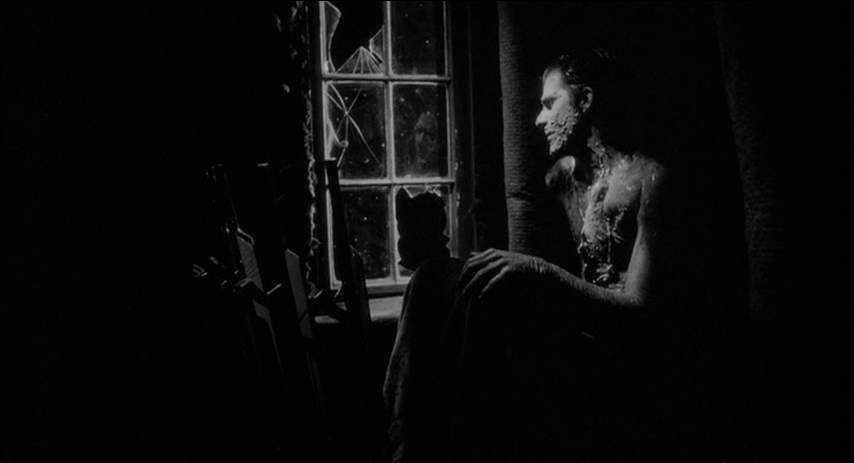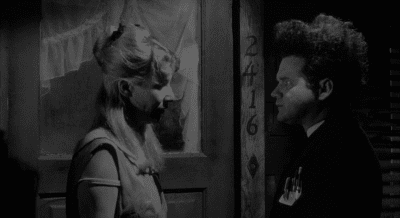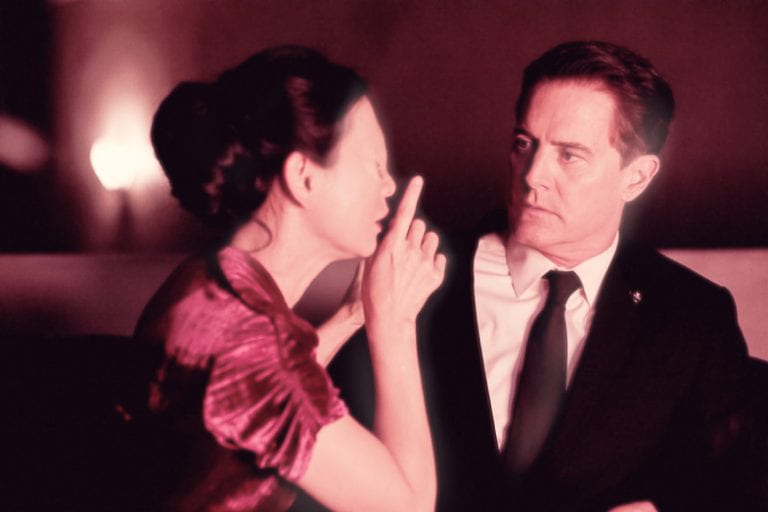For several years now, really since the conclusion of Twin Peaks: The Return, I’ve wanted to work on a David Lynch retrospective. He’s my favorite director and with some of his films, it had been years since I had seen them. With the quality of work that already exists on Lynch’s films, this felt like a daunting task but after years of working on other projects, it was time. So here we are, at the beginning with a film that can best be described as a journey of the spirit, Eraserhead.
Watching Eraserhead for the first time in several years brought about a lot of feelings. It’s almost cliché to call Lynch’s films “moving paintings” but Eraserhead truly is. It’s obviously not a traditional film by any means and that requires turning off one’s traditional way of interpreting film. It would be easy to conclude that this film is about fatherhood and all of the fears and feelings that go along with it, but that to me feels like it’s missing the point of the film. Fatherhood and the baby itself aren’t the crux of the film, they’re a mere symptom in this fever dream.
There’s this man…
Eraserhead has been called by Lynch himself his most spiritual film, a statement I will freely admit that I didn’t always understand. Repeat viewings and trying to allow the film to wash over me rather than me trying to analyze every little detail has changed that though. The film opens with a series of shots that leads to a man pulling gears. He almost seems to be in some kind of power position within the universe. Whether his pulling of these gears and levers is what lead to the birth of Henry and Mary’s child or not is irrelevant. What this speaks to is a system in the universe that we have no control over.
Many younger people obsess over the larger questions in life. What is the afterlife? Does time really just go on forever? How did the universe begin and what else is out there? As we get older and busier in our own lives, these questions and often times, fears, tend to subside. We either have beliefs we’re content with or we simply don’t give these questions as much time to dwell on.

Eraserhead at its core is about living a life we don’t want, a life we have no control over and this man, pulling the levers of life, speaks to a lack on control we as humans have. We don’t know exactly what is out there but there is something bigger than us and to some, that unknown is a terrifying thought.
For an artist like Lynch who has built a career off defying systems and trying to do things his own way, this man with the sores on his face, pulling the levers, could represent the obstacles Lynch himself was facing at the time. A position of power who was creating the circumstances we’re forced to live within. The rules we have to abide by. The baby, which does seem to come as a result of these levers being pulled, was representative of the hand we’re dealt and the responsibilities we’re expected to assume, even if we don’t want them.
In Heaven, Everything is Fine
Much of the film is about Henry adapting to this new life, this new hand he’s been dealt. His girlfriend Mary, he’s expected to marry and she moves in. This challenging child, who is monster like in appearance and never stops crying, becomes the focus of Henry and Mary’s lives. They’ve given up everything to care for this child, a child neither of them appeared to be prepared for or even want.
Mary’s sudden exit, telling Henry that she “just needs a decent night’s sleep” and that “she’ll do what she needs to do” conjure thoughts of possible suicide. It is interesting to note that we only see Mary once after this, shown in bed with Henry as he’s descending more and more into his own instability. Later, when Henry is asked by the attractive women across the hall where his wife is, he isn’t sure. He questions if she went back to her parents, again. In a film all about escaping lives we don’t want, it’s not unfathomable to think that Mary had escaped the life she didn’t want through suicide and Henry is unable to process this, being alone with this child now. While there is little to no narrative evidence to conclude that Mary committed suicide, it would create an interesting narrative to have Mary escape via suicide, whereas Henry would go on a spiritual journey to become free of his.

While there are many ways to interpret the lady in the radiator, she strikes me as a spiritual guide of sorts. She is a beacon of hope for Henry, trying to guide him away from the existence he so desperately wants to escape. In later Lynch works, he would return to this idea of a guide, with Frank Booth in Blue Velvet serving as a guide of sorts to Jeffrey Beaumont. In that case, Frank was guiding Jeffrey through a metaphorical underworld, a dark side to life that Jeffrey was not privy to. In the Twin Peaks narrative, Phillip Jeffries also serves as a guide, in this case to Agent Cooper, showing him that you can indeed navigate between two worlds and the dangers that come along with that.
For Henry in Eraserhead, the lady in the radiator exists to show him an escape, a better way of life. Henry’s sexual experience with the lady across the hall, which very much feels like a dream, begins a process of Henry taking his life back into his own hands and not doing what’s expected of him. Onscreen, we see a dramatic depiction of Henry’s newfound desire for freedom, a desire to escape the life he has, which isn’t the life he wants.
The actual act of killing the baby is symbolic for the fact that it’s simply a visual depiction to breaking the ties that hold us down. For a young filmmaker like David Lynch at the time, it could be a representation of seeking independence from the film industry and the games that are required to be played to succeed in that given industry. The man with the gears can no longer pull the levers of life if we take back our freedom and choose our own path.
The Lynchian Universe
The most frequently cited similarity between Eraserhead and other Lynch works is the chevron pattern used both in the scenes from the lady in the radiator and in the Red Room / Black Lodge from Twin Peaks. Both places aren’t actual physical locations, they’re constructs of the mind and subconscious, shared between people and those that exist outside our planes of existence. Are they heaven, hell or something in between? That’s debatable.
The other major comparison to make here is the “realm” that Agent Cooper in Part 3 of The Return finds himself in and the space that the man with the gears occupies in Eraserhead. Both appear to be in space, almost free floating and independent of any and everywhere else. In Part 3 of The Return, although not narratively confirmed, does appear to be across a body of water from The Fireman’s Palace as illustrated in Part 8. Cooper is on a journey of the spirit to get to The Fireman’s Palace whereas Eraserhead seems to depict a place of control, although one could argue that Twin Peaks was doing the same.

So What Does It All Mean?
Who knows? The beauty of Eraserhead is that it’s purposefully abstract enough to allow for many working theories. For me to interpret the film as a young artist expressing his pent up frustrations with the world, the powers that be that we have to contend with and questioning the larger mysteries of life, is valid. But so are theories that I reject such as feelings over fatherhood. I might not subscribe to an overly simple thesis such as that one but that’s not to disqualify it.
Eraserhead, David Lynch has long said, is his most spiritual film. It’s a film that questions life, flirts with death and ponders over what else is out there. It’s a film that examines the possible ways to escape a life we don’t want. In Heaven, everything is fine but do we have to wait to get there? What can we do to “be fine” before we do? Are there men pulling gears somewhere out there determining our fate or is free will more than just an interesting concept? According to Eraserhead, at least in my interpretation, we can take our life into our own hands and be free.




In case people have forgotten about this article, is expands on the importance of the chevron pattern:
Makes You Wish You Spoke A Little French
Between the Two Worlds of Cocteau’s Orpheus and Lynch/Frost’s Twin Peaks
by Robert M. Wolpert, June 2019
https://25yearslatersite.com/2019/07/05/a-comparison-of-jean-cocteaus-orpheus-1950-and-twin-peaks/
You didn’t address the ending, where Henry’s head comes off and is made into pencil erasers (thus the title). Shouldn’t that be figured into your interpretation of what the film’s “about”, since it comes after what you interpret as his liberation from forces beyond his control?